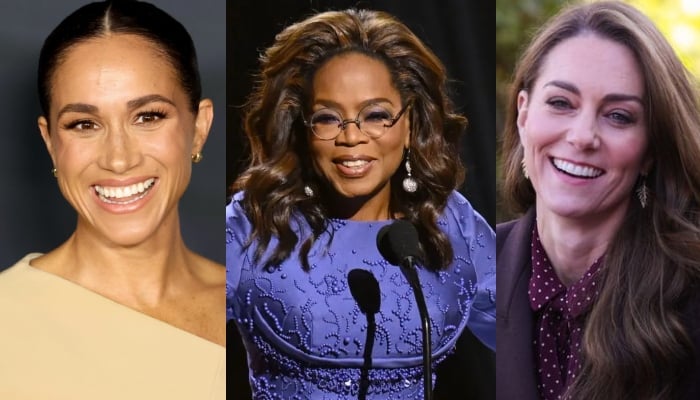A Firm Stand for Privacy
Prince William has decisively rejected an offer from Oprah Winfrey for an exclusive interview with Princess Catherine, signaling a fierce commitment to protecting his wife from further media scrutiny. The offer, described as an opportunity for Catherine to share her perspective on resilience, motherhood, and royal life, was met with a swift refusal, with William reportedly citing the lingering pain from the 2021 Oprah interview with Prince Harry and Meghan Markle. That bombshell conversation, watched by millions, sparked intense controversy and fueled years of online harassment targeting Catherine, leaving deep scars on the Wales family.
The 2021 Interview’s Lasting Impact

In March 2021, Harry and Meghan’s candid sit-down with Oprah sent shockwaves through the monarchy. Aired on CBS, the interview drew global attention with raw revelations about their struggles within the royal family. Meghan spoke of feeling trapped, isolated, and unsupported, even battling self-destructive thoughts, while Harry described fractured family ties and financial cutoffs. The couple’s claims, including concerns about their son Archie’s skin tone and a dispute over a flower girl dress incident involving Catherine, painted the royal family in a harsh light, with William and Catherine often cast as antagonists in public narratives.
The fallout was immediate and brutal. Social media platforms turned into battlegrounds, with Catherine facing relentless cyberbullying—ranging from attacks on her appearance and parenting to baseless rumors about her marriage and health. The interview’s ripple effects persisted, exacerbated by the global reach of hashtags and smear campaigns. For Catherine, who was quietly battling cancer by 2024, the online hate intensified personal struggles, making William’s protective instincts even stronger.
Questioning the Narrative
Over time, discrepancies in the 2021 interview surfaced, fueling skepticism about some claims. Meghan’s assertion that she was denied mental health support and stripped of personal freedoms, like her passport, was countered by palace sources clarifying that passports are routinely secured for royals during official duties—a standard practice, not punishment. Her half-sister, Samantha, also challenged Meghan’s narrative of family estrangement, sharing photos that suggested a more complex dynamic. Prince William, addressing the racism allegation directly during a 2021 school visit, declared, “We are very much not a racist family,” a rare public rebuttal reflecting the family’s hurt.
These inconsistencies, amplified online, shifted public discourse and intensified scrutiny on the original interview. Reports suggest Oprah herself has privately expressed regret over the 2021 sit-down, reflecting on how unverified claims may have skewed perceptions and fueled division. While no confirmed public apology has been documented, whispers of her introspection highlight a growing awareness of the interview’s unintended consequences.
William’s Resolute Rejection
Oprah’s recent offer to Catherine was pitched as a platform to share her story, potentially addressing her health challenges and royal duties while clearing up misconceptions. However, William’s response was unequivocal. Insiders report he stated, “It’s too late to apologize when you realize Meghan Markle lied,” emphasizing that Catherine has endured enough cyberbullying since the 2021 interview. He reportedly added that no royal would accept another exclusive from Oprah, signaling a permanent rejection rooted in broken trust.
This wasn’t merely a refusal but a bold statement of loyalty and protection. William’s stance reflects years of frustration, from the initial betrayal he felt watching his brother’s interview to the ongoing toll of online harassment on Catherine. The decision aligns with his advocacy for mental health through initiatives like Heads Together, which emphasizes combating online hate—a cause now deeply personal.
A New Era for the Monarchy
William’s rejection marks a turning point for the monarchy’s relationship with the media. The 2021 interview exposed vulnerabilities in an institution built on discretion, and William’s response signals a shift toward caution and control. By prioritizing privacy over public spectacle, he and Catherine are redefining royal boundaries in an era where narratives spread instantly online. This move resonates with King Charles’s vision of a modernized monarchy that balances tradition with personal dignity.
For Catherine, the focus remains on recovery, family, and her impactful work in early childhood development. Her silence speaks volumes, channeling energy into shielding Prince George, Princess Charlotte, and Prince Louis from public chaos. The rejection also challenges media giants like Oprah, whose empire thrives on intimate confessions, to reconsider the impact of sensationalized interviews where emotional storytelling can outpace fact-checking.
A Broader Message
This saga underscores the fragility of truth in the digital age. Studies indicate nearly 60% of adults face online harassment, and Catherine’s experience highlights the real-world consequences of viral narratives. William’s stand not only protects his family but also sets a precedent for public figures to draw firmer boundaries with the press. As the Waleses focus on authenticity and resilience, their actions resonate with supporters, with polls showing 70% of Britons admire their steadfastness amid royal turmoil.
The rift with Harry and Meghan remains deep, with reconciliation seeming distant. Yet, William and Catherine’s choice to prioritize truth, privacy, and healing over media spectacle signals a monarchy in transition—one that values loyalty and dignity over fleeting headlines.
